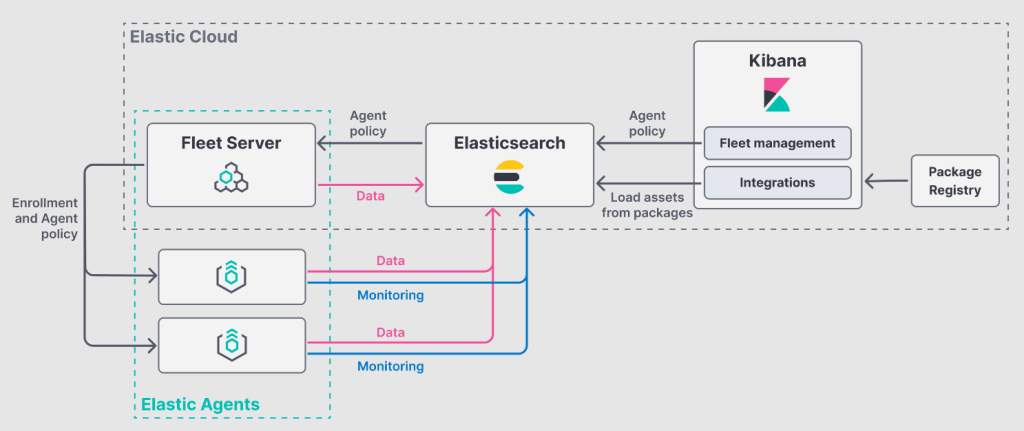
What is Elastic Agent:
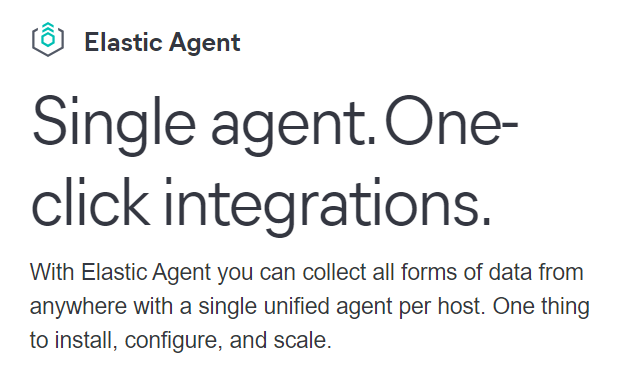
Elastic Agent is a unified tool that simplifies adding monitoring capabilities to your systems. It can collect various data types, including logs, metrics, and even security information, from your hosts. It also offers centralized management on Elastic Cloud, allowing for remote configuration changes.
Elastic Agents are part of the Elastic ecosystem designed to simplify and unify data collection across various sources, facilitating observability, security, and search functionalities. They allow for efficient monitoring of logs, metrics, and other types of data from hosts, thereby enhancing the deployment and management of monitoring infrastructure. Elastic Agents operate under a single, unified approach, aiming to streamline data collection processes, configuration, and scalability across different environments
Elastic Agent Features:
- Unified Monitoring: Collects logs, metrics, and other data from hosts in a single, streamlined way.
- Centralized Management: Manage configurations remotely through Elastic Cloud for scalability and ease of use.
- Security Protection: Offers security features to safeguard your hosts.
- Data Querying: Enables querying data directly from operating systems for troubleshooting purposes.
- External Integrations: Connects with external services and systems to provide broader insights.
- Scalability: Designed for efficient deployment of monitoring across large infrastructures.
How Elastic Agent Works:
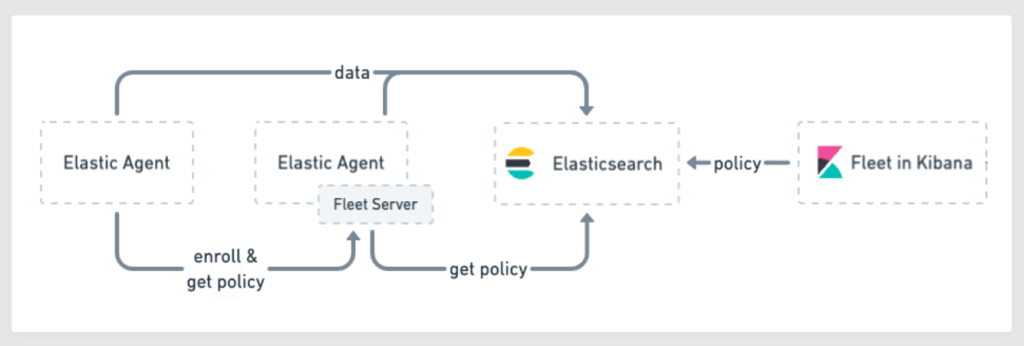
- Single Agent Installation: You install a single Elastic Agent on each host you want to monitor.
- Policy Application: Define policies that specify which data sources (logs, metrics, etc.) to collect and on which hosts. You can apply a policy to multiple agents for consistent configuration at scale.
- Data Collection: The agent gathers data based on the applied policy, including logs from specific locations, system metrics, and security information.
- Data Forwarding: Collected data is forwarded to the Elastic Stack (Elasticsearch for storage and Kibana for visualization) for analysis and visualization.
- Policy Updates: When you update a policy with new integrations or configurations, the enrolled agents automatically receive the changes, simplifying management.

Elastic Agents collect and forward data by being deployed on hosts, where they monitor local conditions and can also gather data from remote services and hardware. This process is facilitated through integrations that connect Elastic to external systems, offering streamlined insights and actions based on the collected data. The agents are managed via policies that specify which integrations to run and on which hosts, allowing for dynamic and scalable configuration management across multiple agents.
Elastic’s Fleet component plays a crucial role in managing Elastic Agents by providing a web-based interface for central management. This interface allows users to monitor agent health, manage policies, and roll out updates or changes to multiple agents simultaneously, ensuring efficient and consistent management across the infrastructure.
In summary, Elastic Agents and Fleet offer a comprehensive and scalable solution for data collection and management, simplifying the process of deploying monitoring and security measures across a wide array of environments.
Elastic Agent for collection APM Data
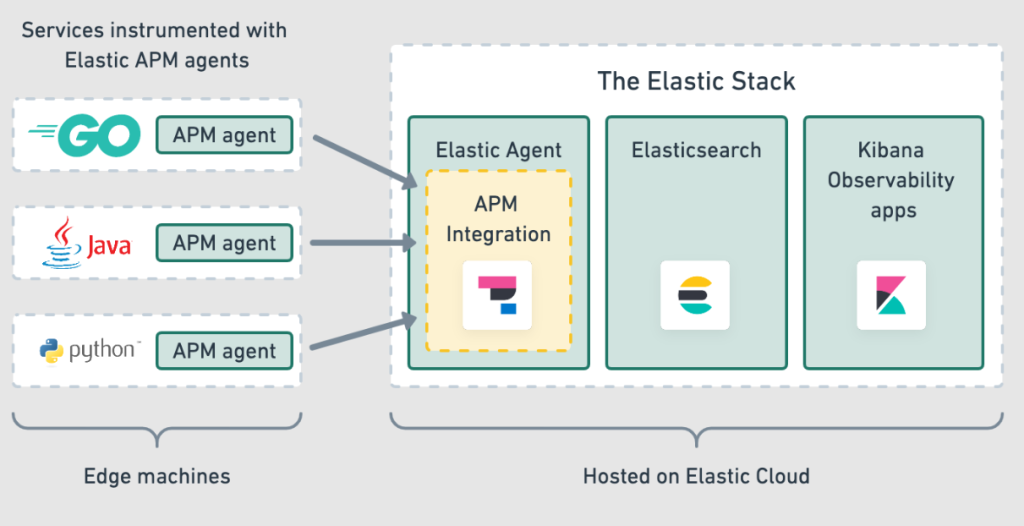
What is Fleet Server
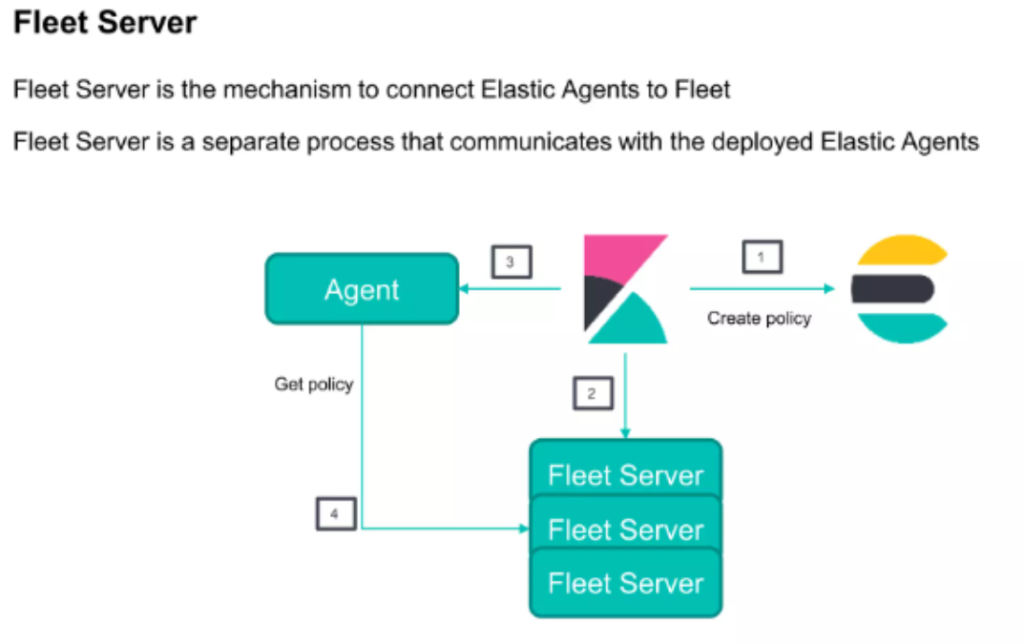
I’m a DevOps/SRE/DevSecOps/Cloud Expert passionate about sharing knowledge and experiences. I am working at Cotocus. I blog tech insights at DevOps School, travel stories at Holiday Landmark, stock market tips at Stocks Mantra, health and fitness guidance at My Medic Plus, product reviews at I reviewed , and SEO strategies at Wizbrand.
Do you want to learn Quantum Computing?
Please find my social handles as below;
Rajesh Kumar Personal Website
Rajesh Kumar at YOUTUBE
Rajesh Kumar at INSTAGRAM
Rajesh Kumar at X
Rajesh Kumar at FACEBOOK
Rajesh Kumar at LINKEDIN
Rajesh Kumar at PINTEREST
Rajesh Kumar at QUORA
Rajesh Kumar at WIZBRAND

 Starting: 1st of Every Month
Starting: 1st of Every Month  +91 8409492687
+91 8409492687  Contact@DevOpsSchool.com
Contact@DevOpsSchool.com
